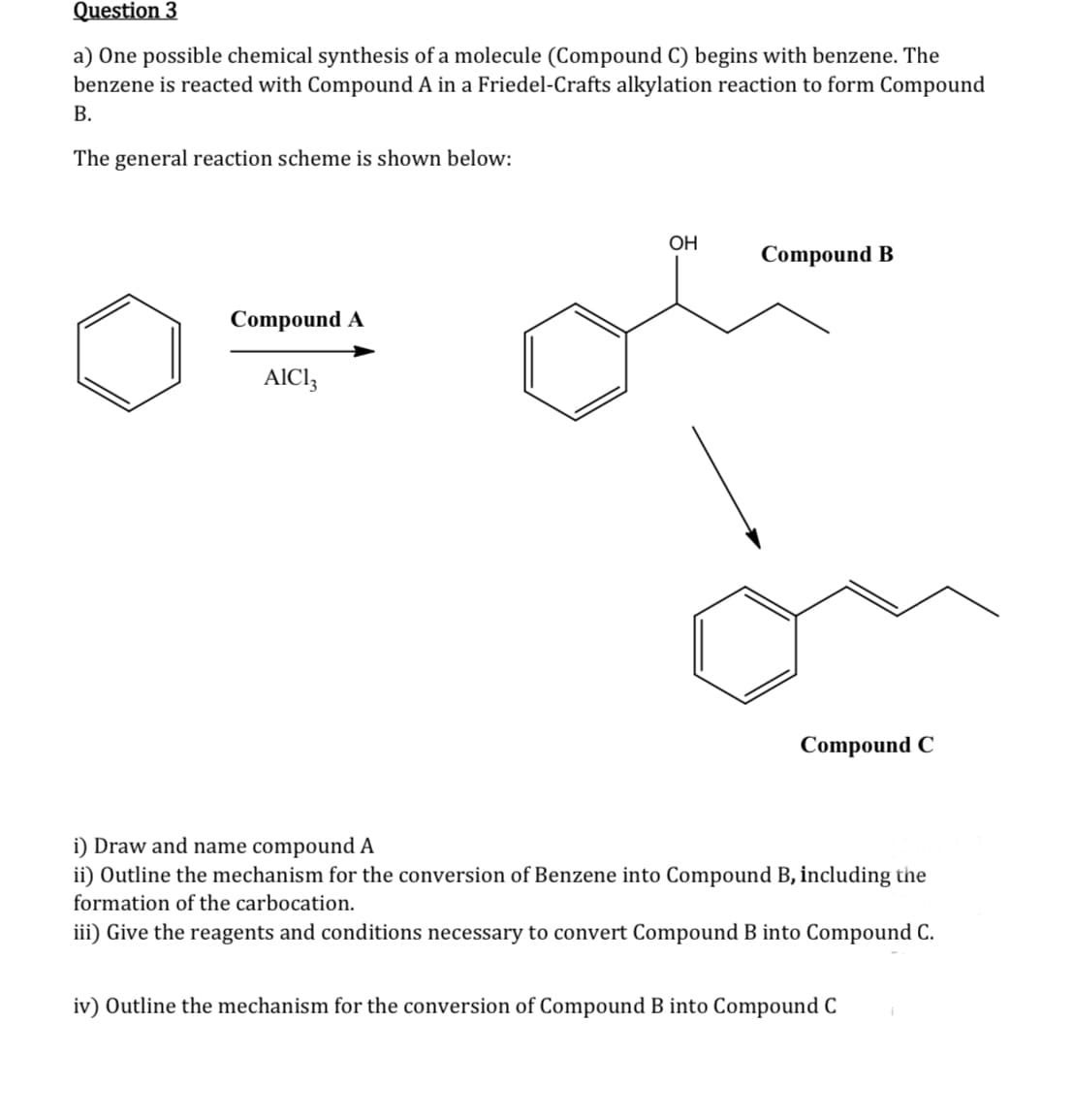Question 3 a) One possible chemical synthesis of a molecule (Compound C) begins with benzene. The benzene is reacted with Compound A in a Friedel-Crafts alkylation reaction to form Compound B. The general reaction scheme is shown below: Compound A AIC13 OH Compound B Compound C i) Draw and name compound A ii) Outline the mechanism for the conversion of Benzene into Compound B, including the formation of the carbocation. iii) Give the reagents and conditions necessary to convert Compound B into Compound C. iv) Outline the mechanism for the conversion of Compound B into Compound C
Question 3 a) One possible chemical synthesis of a molecule (Compound C) begins with benzene. The benzene is reacted with Compound A in a Friedel-Crafts alkylation reaction to form Compound B. The general reaction scheme is shown below: Compound A AIC13 OH Compound B Compound C i) Draw and name compound A ii) Outline the mechanism for the conversion of Benzene into Compound B, including the formation of the carbocation. iii) Give the reagents and conditions necessary to convert Compound B into Compound C. iv) Outline the mechanism for the conversion of Compound B into Compound C
Chemistry
10th Edition
ISBN:9781305957404
Author:Steven S. Zumdahl, Susan A. Zumdahl, Donald J. DeCoste
Publisher:Steven S. Zumdahl, Susan A. Zumdahl, Donald J. DeCoste
Chapter1: Chemical Foundations
Section: Chapter Questions
Problem 1RQ: Define and explain the differences between the following terms. a. law and theory b. theory and...
Related questions
Question
i,ii,iv please

Transcribed Image Text:Question 3
a) One possible chemical synthesis of a molecule (Compound C) begins with benzene. The
benzene is reacted with Compound A in a Friedel-Crafts alkylation reaction to form Compound
B.
The general reaction scheme is shown below:
Compound A
AIC13
OH
Compound B
Compound C
i) Draw and name compound A
ii) Outline the mechanism for the conversion of Benzene into Compound B, including the
formation of the carbocation.
iii) Give the reagents and conditions necessary to convert Compound B into Compound C.
iv) Outline the mechanism for the conversion of Compound B into Compound C
Expert Solution
This question has been solved!
Explore an expertly crafted, step-by-step solution for a thorough understanding of key concepts.
Step by step
Solved in 2 steps with 2 images

Knowledge Booster
Learn more about
Need a deep-dive on the concept behind this application? Look no further. Learn more about this topic, chemistry and related others by exploring similar questions and additional content below.Recommended textbooks for you

Chemistry
Chemistry
ISBN:
9781305957404
Author:
Steven S. Zumdahl, Susan A. Zumdahl, Donald J. DeCoste
Publisher:
Cengage Learning

Chemistry
Chemistry
ISBN:
9781259911156
Author:
Raymond Chang Dr., Jason Overby Professor
Publisher:
McGraw-Hill Education

Principles of Instrumental Analysis
Chemistry
ISBN:
9781305577213
Author:
Douglas A. Skoog, F. James Holler, Stanley R. Crouch
Publisher:
Cengage Learning

Chemistry
Chemistry
ISBN:
9781305957404
Author:
Steven S. Zumdahl, Susan A. Zumdahl, Donald J. DeCoste
Publisher:
Cengage Learning

Chemistry
Chemistry
ISBN:
9781259911156
Author:
Raymond Chang Dr., Jason Overby Professor
Publisher:
McGraw-Hill Education

Principles of Instrumental Analysis
Chemistry
ISBN:
9781305577213
Author:
Douglas A. Skoog, F. James Holler, Stanley R. Crouch
Publisher:
Cengage Learning

Organic Chemistry
Chemistry
ISBN:
9780078021558
Author:
Janice Gorzynski Smith Dr.
Publisher:
McGraw-Hill Education

Chemistry: Principles and Reactions
Chemistry
ISBN:
9781305079373
Author:
William L. Masterton, Cecile N. Hurley
Publisher:
Cengage Learning

Elementary Principles of Chemical Processes, Bind…
Chemistry
ISBN:
9781118431221
Author:
Richard M. Felder, Ronald W. Rousseau, Lisa G. Bullard
Publisher:
WILEY